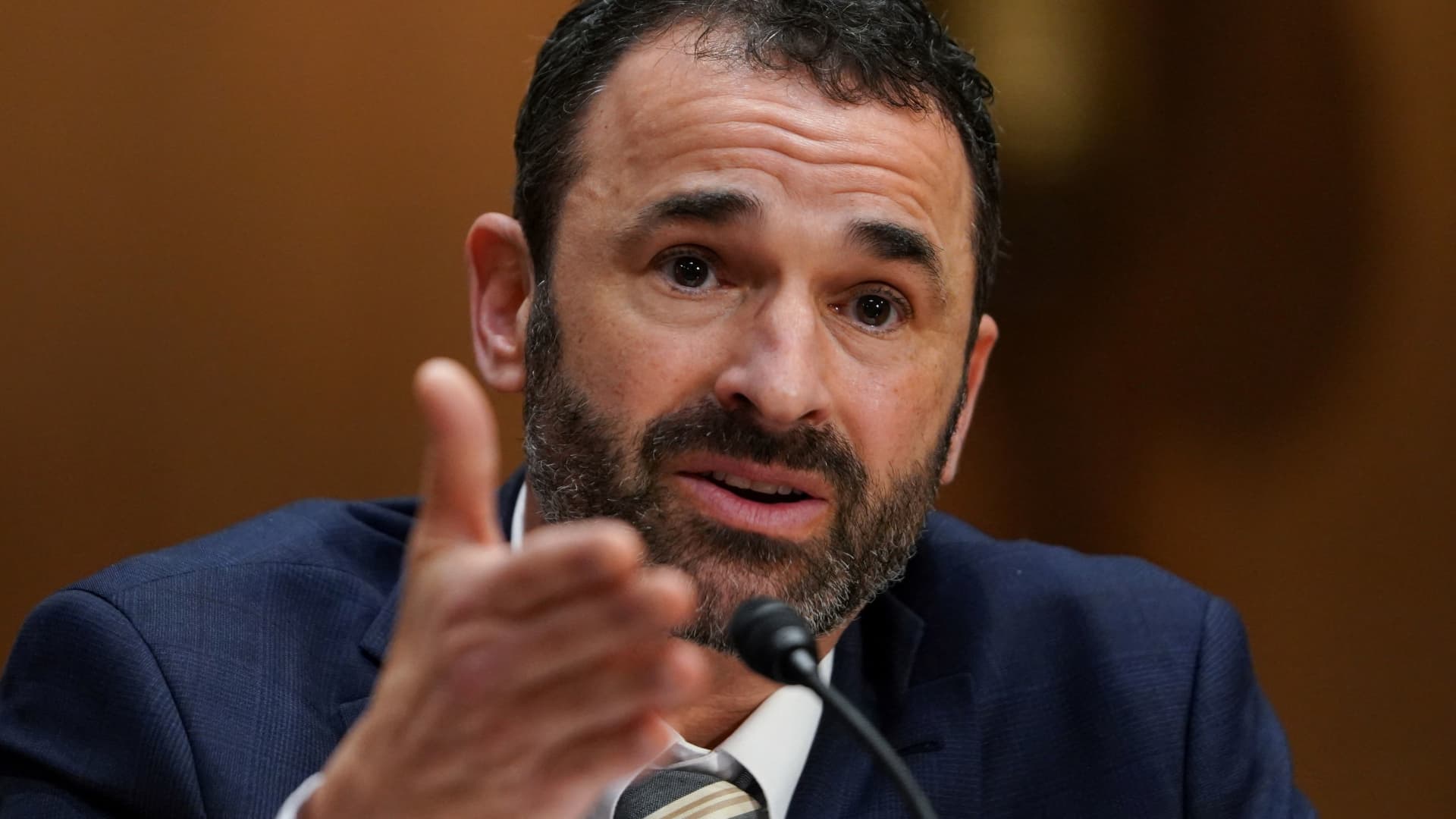Column: A new initiative by Biden that might finally bring drug prices down

The most frustrating thing about America’s failure to rein in drug prices is that a weapon against Big Pharma’s profiteering has been hiding in plain sight — and never used — for more than 40 years.
But it’s now being unsheathed by the Biden White House.
We’re talking about a provision of the Bayh-Dole Act of 1980, which was enacted to give private enterprise more latitude to exploit government-funded research in the public interest.
The solution to high drug prices does not involve new legislation but already exists in the unused, unenforced march-in provision of the Bayh-Dole Act.
— Peter S. Arno & Michael H. Davis (2001)
After resisting for years calls to apply rights granted the government by Bayh-Dole to bring down drug prices, President Biden has reversed himself. On Dec. 8, the administration issued a proposal to do just that for public comment.
This could be a major step toward bringing drugmakers’ pricing decisions back to Earth, and one that doesn’t require congressional action.
The significance of Biden’s move can’t be overstated, for it signals that drugmakers that abuse their patent rights by profiteering may lose their patents altogether. You can expect Big Pharma to pay attention to this threat.
Bayh-Dole empowered private companies to commercialize inventions that grew out of federally funded research, but it reserved certain rights for the government to protect the taxpayers’ investments.
Chief among them are “march-in rights.” These allow the government to require that the holder of rights to a federally funded product license the product to manufacturers on “terms that are reasonable.”
If the rights holder fails to do that, either by refusing to license the product at all or doing so only on unreasonable terms, the government can “march in” — take over the licensing on its own.
Ever since the law’s enactment, lawyers and lobbyists have tangled over whether “reasonable” terms include a reasonable price. Federal agencies, including the Department of Health and Human Services and the National Institutes of Health (which is part of HHS), have always followed the lead of industry lobbyists in ruling that the answer is no.
That’s absurd, of course. Peter Arno and Michael H. Davis, a professor of medicine and of law, respectively, observed in 2001 that U.S. law has always considered price to be a component of the terms of a contract. As a result, they wrote, “the solution to high drug prices does not involve new legislation but already exists in the unused, unenforced march-in provision of the Bayh-Dole Act.”
Bayh-Dole’s reach is exceptionally broad. A 2020 study found that funding by the National Institutes of Health — $230 billion in total — played a role in research associated with every new drug approved by the Food and Drug Administration from 2010 to 2019. The funding produced 22,000 patents.
The role of government funding varies from product to product, but in some cases it’s indisputable. The biotech firm Moderna, for example, received more than $2.5 billion in federal grants and guarantees while it developed its COVID-19 vaccine.
Without that assistance, Moderna’s vaccine might not exist. The product was the source of all of Moderna’s $20.6 billion in profits on $37.8 billion in revenue in 2022 and 2021 — money the company has used to fund some $3 billion in stock buybacks to benefit shareholders while jacking up the price of its vaccine to $130 per dose.
Moderna says that price aimed to reflect the “value that COVID-19 vaccines bring to patients, healthcare systems, and society,” not to balance its costs against a price that might maximize consumer access. Is that a “reasonable” term? You be the judge.
Then there’s Xtandi, a prostate cancer drug developed at UCLA. Pfizer and the Japanese drug company Astellas, which hold the marketing licenses for Xtandi, sell it for $189,800 a year. (UCLA sold its license for $520 million in 2016.)
In Canada, a year’s supply costs $32,558, and in Japan it costs $31,594. Neither country contributed a dime to Xtandi’s development. In no other developed country does it cost more than $57,000.
Yet the NIH has twice rejected petitions urging it to march-in license the drug to alternative manufacturers so it can be sold for less, even though the government’s role in its development is cited in all three of the patents covering the drug. The Department of Health and Human Services issued the most recent rejection in March.
Indeed, the agency has rejected every one of the seven petitions for the government to exercise its march-in rights.
Former Sen. Birch Bayh (D-Ind.) and the late Sen. Bob Dole (R-Kan.), the authors of Bayh-Dole, put their thumbs on the scale in the debate over whether the law incorporated price in a 2002 statement to the Washington Post. They said that “Bayh-Dole did not intend that government set prices on resulting products. The law makes no reference to a reasonable price that should be dictated by the government.” (Bayh and Dole were responding to an op-ed in the Post by Arno and Davis.)
A couple of points about this. First, using march-in rights to counter a drug manufacturer’s excessive pricing is not the same as setting or dictating prices. The law specifies only that the licensing terms be reasonable but doesn’t specify what those terms might be; to the extent they include price, that factor presumably would be set in the open market.
Second, in 1997 Bayh himself, in his post-Senate role of corporate lobbyist, had cited his own legislation in asking then-Health and Human Services Secretary Donna Shalala to march in to force the licensing of a medical product to his client, which had been hampered by the original licensee’s demand for “unreasonably high royalties” that amounted to an “unearned markup.”
In other words, the licensee had set its price too high. (Shalala kicked the decision on Bayh’s request over to the NIH, which turned him down.)
Biden signaled a new approach to march-in rights on Dec. 7, when he announced a policy specifying that “price can be a factor in considering whether a drug is accessible to the public” under Bayh-Dole.
He set the initiative in the context of other steps the administration has taken to bring down healthcare costs, such as “capping the cost of insulin at $35 per product per month for seniors” and “finally allowing Medicare to negotiate lower prescription drug prices.”
Industry has predictably squealed like pigs on the way to the abattoir.
The U.S. Chamber of Commerce called Biden’s initiative “unprecedented.” That’s obviously true, given that march-in rights have never been utilized in the 43 years since the passage of Bayh-Dole. But it’s not an advertisement for good public policy.
Morever, chamber spokesman Neil Bradley went way over the top in stating that “the Biden administration’s conclusion that they have the authority to seize patents for certain medicines not only contradicts the law, it contradicts the conclusion of prior Republican and Democratic administrations. … If patents for medicine are seized today, what property will the government seize tomorrow?”
The patents at issue belong partially to the U.S. government — it’s not “seizing” anything it doesn’t already own. As for the law, see above.
And as for the inaction of “prior Republican and Democratic administrations,” that’s a testament to the lobbying power of the pharmaceutical industry, not to the wisdom of federal lawmakers over the last four decades. (It’s probably only a coincidence that Jennifer Walton, the chief government lobbyist for the drug company Pfizer, is on the chamber’s board of directors.)
The chamber also makes the familiar and cynical claim that Biden’s move “will result in fewer medical breakthroughs, ultimately hurting patients [and] destroying America’s ability to discover the next breakthrough treatment or cure.”
Is this any different from the claim Big Business makes about any government initiative designed to advance the public interest? There’s no evidence that requiring drug companies to sell their products at a defensible price will turn off the spigot of productive research and development; Big Pharma’s pipeline has to be kept filled, after all.
Moreover, “breakthrough” drugs won’t do much good if patients can’t afford to access them or they’re priced so high that insurers won’t cover them. Americans should have access to the drugs their taxes helped fund.







